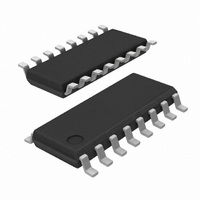SI3200-GS Silicon Laboratories Inc, SI3200-GS Datasheet - Page 34

SI3200-GS
Manufacturer Part Number
SI3200-GS
Description
IC LINEFEED INTRFC 100V 16SOIC
Manufacturer
Silicon Laboratories Inc
Series
ProSLIC®r
Specifications of SI3200-GS
Function
Subscriber Line Interface Concept (SLIC), CODEC
Interface
GCI, PCM, SPI
Number Of Circuits
2
Voltage - Supply
3.3V, 5V
Current - Supply
110µA
Power (watts)
941mW
Operating Temperature
-40°C ~ 85°C
Mounting Type
Surface Mount
Package / Case
16-SOIC (3.9mm Width)
Includes
Battery Switching, BORSCHT Functions, DTMF Generation and Decoding, FSK Tone Generation, Modem and Fax Tone Detection
Lead Free Status / RoHS Status
Lead free / RoHS Compliant
Lead Free Status / RoHS Status
Lead free / RoHS Compliant, Lead free / RoHS Compliant
Available stocks
Company
Part Number
Manufacturer
Quantity
Price
Company:
Part Number:
SI3200-GS
Manufacturer:
SILICON
Quantity:
1
Part Number:
SI3200-GS
Manufacturer:
SILICON LABS/芯科
Quantity:
20 000
Company:
Part Number:
SI3200-GSR
Manufacturer:
SILICON
Quantity:
12 000
Si3220/Si3225
VOC voltage boost associated with a non-zero
VOCDELTA value. With VOCDELTA = 0 in the case of
the Si3200, the adaptive linefeed transition still changes
the source impedance from 640 Ω to 320 Ω , and there
is a corresponding discontinuity at the transition point.
In the case of the discrete bipolar linefeed, since the
source impedance is 320 Ω both before and after the
adaptive linefeed transition, the V/I curve exhibits no
discontinuity
VOCDELTA = 0.
Off-Hook to On-Hook Transition
As the dc loop is opened, the dc feed will exit the
constant current region (point 4) and enter the 320 Ω
source impedance region. As the current in the loop
collapses, the VTIP/RING voltage will linearly increase
until VOCHTH (point 5) is reached. At this point
adaptive linefeed will transition to a source impedance
of 640 Ω (320 Ω for discrete bipolar transistor linefeed)
and decrease the VOC voltage by VOCDELTA (point 6).
Load lines of 10 k Ω , 1930 Ω, and 1800 Ω are shown in
Figure 16. These load lines intercept the linefeed V/I
curve at the V/I point that would result if a load of that
resistance value were connected across TIP and RING.
VOCTRACK and Adaptive Linefeed
Hysteresis
The two thresholds, VOCLTH and VOCHTH, control
adaptive linefeed hysteresis as seen in Figure 16.
VOCTRACK is a RAM location and is the actual open-
circuit voltage that is being fed to the line. VOCTRACK
is dependent on the measured VBAT voltage. The
behavior of VOCTRACK is as shown in the equation
below. Simply put, as long as VBAT is sufficient to
supply VOC + VOV + VCM, VOCTRACK is equal to the
programmed VOC. However, if VBAT becomes too
small to support VOC + VOV + VCM, then VOCTRACK
will track the battery voltage so that the programmed
VOV and VCM are satisfied at the expense of a reduced
VOC voltage. In the example of Figure 16, therefore,
VOCTRACK = VOC = 48 V.
The following equation describes VOCTRACK behavior.
The values of VOCLTH and VOCHTH are set relative to
VOCTRACK. In the example shown in Figure 16,
VOCLTH is given as –7 V and VOCHTH as +2 V. This
implies that the VOCLTH threshold is located 7 V below
the prevailing value of VOCTRACK, while the VOCHTH
threshold is located 2 V above the prevailing value of
VOCTRACK. Therefore, the VOCLTH and VOCHTH
34
|
|
V
V
BAT
BAT
|
|
≥
<
V
V
OC
OC
+
+
V
V
OV
OV
at
+
+
V
V
CM
CM
the
⇒
⇒
VOCTRACK
VOCTRACK
transition
=
=
|
VOC
V
BAT
points
|
−
V (
OV
+
when
V
CM
Rev. 1.0
)
thresholds will automatically track the battery voltage
along with VOCTRACK.
In order to provide an adequate level of adaptive
linefeed hysteresis between the on-hook to off-transition
and the off-hook to on-hook transition, VOCLTH is
programmed below VOCTRACK (e.g., –7 V relative to
VOCTRACK), and VOCHTH is programmed above
VOCTRACK (e.g., +2 V above VOCTRACK). Also,
VOCHTH must be less than VOV –1 V to ensure that a
proper adaptive linefeed transition will occur in a
reduced battery scenario.
Ground Start Operation
To configure the dc feed for ground start operation, it is
necessary to write the LINEFEED register with the
value corresponding to either TIP-OPEN (LF[2:0] = 011)
or RING-OPEN (LF[2:0] = 111). The TIP-OPEN and
RING-OPEN linefeed modes place the indicated lead in
the OPEN state (>150 k Ω ) while the other lead remains
active.
In ground start operation, an off-hook condition is
signaled by the CPE (Customer Premise Equipment) by
connecting the active lead to earth ground.
The active lead presents a 640 Ω source impedance
before the adaptive linefeed transition (320 Ω for a
discrete bipolar linefeed), and a 320 Ω source
impedance after the adaptive linefeed transition, as
shown in Figure 17. As for loop start operation, the
adaptive linefeed transitions are governed by the
contents
addresses.
The OPEN lead presents a high-impedance (>150 k Ω ).
Figure 17 illustrates the ground-start VRING/IRING
behavior using VOC = 48 V and I
TIP-OPEN linefeed state. The ground key current
thresholds are programmable via the LONGLOTH and
LONGHITH RAM addresses. The LONGLPF RAM
address provides filtering of the measured longitudinal
currents, and the LONGDBI RAM address provides de-
bouncing. The LONGHI status bit in register LCRRTP
indicates when a ground key event has been detected.
Upon detecting a ground key event, the linefeed
automatically transitions to the FORWARD ACTIVE (if
initially in TIP-OPEN) or REVERSE ACTIVE (if initially
in RING-OPEN). See “Ground Key Detection” on
page 43 for additional details.
of
the
VOCLTH
and
LIM
VOCHTH
= 24 mA in the
RAM












